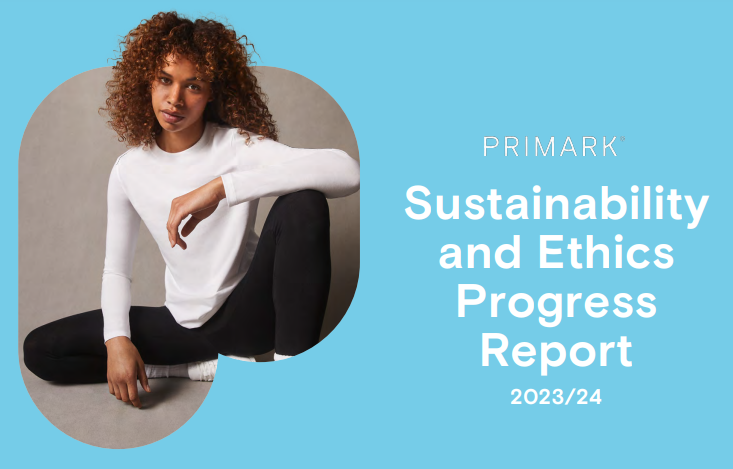Global fashion retailer Primark has unveiled its Sustainability and Ethics Progress Report 2023/24, presenting a detailed account of its strides toward embedding sustainability and ethical practices into its operations. The report’s theme ‘Update and Evolve’, reflects the company’s commitment to delivering affordable yet responsible fashion through its ambitious Primark Cares strategy.
With 450 stores across 17 countries, Primark is positioning itself as a leader in sustainable retail. The report highlights notable achievements across three core pillars: People, Product, and Planet, outlining progress toward its 2030 vision of systemic sustainability integration.
Key Achievements
- Sustainable Fashion Revolution:
- Over 66% of Primark’s clothing is now made from recycled or sustainably sourced materials.
- The Durability Framework ensures clothing longevity, with 66% of products enduring 45+ washes during testing.
- The brand launched its first adaptive clothing range, including affordable adaptive underwear, which won the Disability Smart Inclusive Product Design Award 2024.
- Circular Design and Innovation:
- 3% of products sold this year were designed with circularity in mind.
- Training in circular design principles reached 529 employees, enhancing the lifecycle of Primark’s fashion offerings.
- Carbon Reduction Initiatives:
- Primark reduced emissions across Scopes 1, 2, and 3 by 11.6% year-on-year, with a total decline of 1.9% since 2019.
- Partnering with Maersk, Primark introduced biofuels for shipping, achieving a 40% reduction in shipping-related emissions annually.
People: Empowering Workers Across the Supply Chain
Primark’s supply chain spans 17 countries, with robust measures to enhance worker welfare:
- Living Wage Commitments: Piloted wage data collection across 32 factories in Bangladesh, Cambodia, India, and Türkiye, aiming for transparency and progress on living wages.
- Digital Wage Transformation: Seven Cambodian factories were transitioned to digital wage systems in partnership with the ILO’s Better Work program.
- Worker Well-being Programs: Initiatives like My Life in India trained workers on communication, rights, and workplace health, benefiting domestic migrant workers significantly.
- Mental Health and Safety: Over 630 employees were trained as mental health first responders, while health workshops rolled out in Bangladesh addressed physical and mental health concerns.
Product: Sustainability Meets Affordability
Primark continues to prove that sustainable fashion can be affordable:
- Collaborating with Recover™, the company increased its use of recycled cotton, significantly reducing reliance on virgin materials.
- Repair workshops in France, Italy, and the UK taught 7,157 participants skills to extend the life of their garments, aligning with the Durability Framework.
Planet: Protecting the Environment
Primark’s environmental strategy focuses on emissions reduction, waste management, and compliance with international standards:
- Introduced mandatory GHG emission targets for its top 100 suppliers.
- Expanded audits to tier 2 factories, ensuring transparency and adherence to sustainability goals.
- Replaced single-use plastic hangers with recycled alternatives, supporting the transition toward closed-loop recycling systems.
A Culture of Inclusion and Community Impact
With over 80,000 employees representing 176 nationalities, Primark has made diversity and inclusion a priority:
- Women now hold 47% of senior roles, reflecting a commitment to gender equity.
- The Diverse Minds reciprocal mentoring program bridged generational gaps, fostering empathy and cross-functional understanding.
- Donations to charities, including UNICEF and local organizations, exceeded £3 million, with £1 million raised through customer-driven initiatives.
Adapting to Regulatory Landscapes
Primark’s proactive response to emerging sustainability regulations, such as the European Green Deal, highlights its commitment to compliance. It has implemented the OECD’s Due Diligence Guidance for Responsible Business Conduct, ensuring ethical sourcing and enhanced transparency through its Global Sourcing Map.
Challenges and Future Directions
While celebrating these achievements, Primark acknowledges ongoing challenges, such as managing evolving regulations, ensuring systemic supply chain changes, and maintaining affordability amidst sustainability demands. CEO Paul Marchant emphasized the importance of collaborative efforts, stating, “Sustainability is now woven into how we do business every day. It’s a new and exciting era for Primark as we refresh our approach while delivering for customers, partners, and colleagues.”
Conclusion
Primark’s 2023/24 Sustainability and Ethics Progress Report showcases its unwavering dedication to balancing affordability with responsibility. From empowering workers to pioneering sustainable fashion practices, Primark is setting a benchmark for the industry. The Primark Cares strategy is more than a label—it’s a transformative approach to retail, proving that sustainability can be inclusive and accessible for all.
To read the report: https://primark.a.bigcontent.io/v1/static/Primark-Sustainability-and-Ethics-Progress-Report-2023-2024
